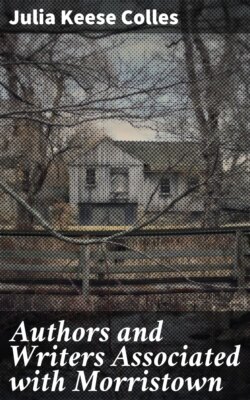Читать книгу Authors and Writers Associated with Morristown - Julia Keese Colles - Страница 12
На сайте Литреса книга снята с продажи.
Mrs. Elizabeth Clementine Kinney.
ОглавлениеTable of Contents
Mrs. Kinney, the mother of the poet, Edmund Clarence Stedman, and daughter of David L. Dodge of New York city, was for several years a resident of Morristown, and will long be remembered with interest and affection by her many friends. Her husband, Mr. William Burnet Kinney, not only resided here in later years, but was born at Speedwell, then a suburb of Morristown, and passed a part of his early boyhood there. To him we shall refer, in the grouping of Editors and Orators.
Mr. Kinney was a brilliant literary man and about this home in Morristown unusual talent and genius naturally grouped themselves. To it came and went the poet Stedman: in the group, we find two gifted women, daughters of Mrs. Kinney, and later on, the same genius developing itself in the son of one of these, the boy Easton, of the third generation.
Mrs. Kinney published in 1855, "Felicita, a Metrical Romance;" a volume of "Poems" in 1867; and, a few years later, a stirring drama, a tragedy in blank verse, entitled "Bianco Cappello." This tragedy is founded upon Italian history and was written during her residence abroad in 1873. While abroad, Mrs. Kinney's letters to The Newark Daily Advertiser gave her a wide reputation and were largely re-copied in London and Edinburgh journals from copies in the New York papers.
Among the "Poems," the one "To an Italian Beggar Boy" is perhaps most highly spoken of and has been chosen by Mr. Stedman to represent his mother in the "Library of American Literature." A favorite also is the "Ode to the Sea." Both pieces are strong and dramatic. The poem on "The Flowers" has been translated into three languages. It opens:
"Where'er earth's soil is by the feet
Of unseen angels trod,
The joyous flowers spring up to greet
These messengers of God."
Mrs. Kinney's sonnets are peculiarly good. Her sonnet on "Moonlight in Italy," which we give to represent her, was written at ten o'clock at night in Italy by moonlight, and has been much praised. Mr. Kingston James, the English translator of Tasso, repeated it once at a dinner table, as a sample of "in what consisted a true sonnet."
